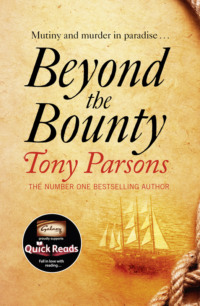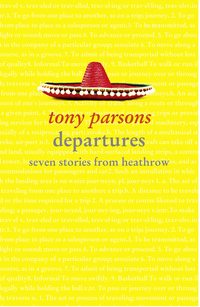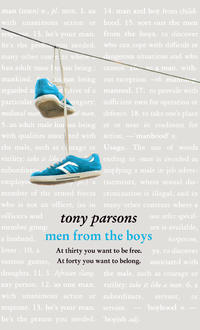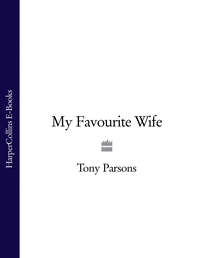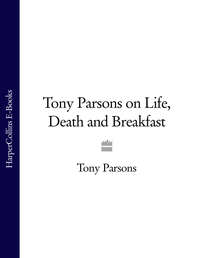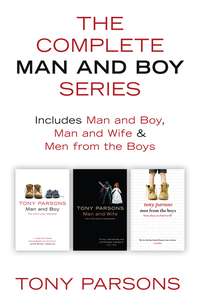
Полная версия
Man and Wife
I talked on in the darkness, feeling the warmth of my wife next to me, trying to reassure myself that this mess could be fixed.
I would call Gina in the morning, I said. I had to get it straight about next Sunday and if I should pick Pat up at the usual time. And I had to apologise for worrying her sick. I hadn’t meant to cause all this trouble. We only went to Paris because I didn’t want Pat to be like the other kids with their part-time dads. The half-French girl who had turned vegetarian, and the countless millions like her. I wanted Pat to feel he had a real father, who did special things with him, adventures that he would remember forever. Like my dad did with me.
My wife kissed me to cheer me up, and no doubt to shut me up, and then she kissed me some more.
It soon became a different kind of kissing. It became the kind of kissing that has nothing to do with soothing and cuddles and reassurance. The kind of kissing that had started everything. I’ll say this for our marriage – it hadn’t changed the quality of the kissing.
Then she was waiting for me, her black hair fanning out across the pillow, her face lit only by the glow of a streetlamp coming through the slats of the blinds. This woman I was still mad about. My wife.
I moved towards her without reaching for the little wooden box in the bedside drawer that contained our family planning.
Then I heard her sigh in the darkness.
‘Don’t make me go through this every time, Harry. Please, darling. Come on. You already have a kid. Didn’t we agree on all that?’
I had been reading a lot about baby hunger recently. It was regularly featured in the ‘You and Yours’ pages of our Sunday paper. Women desperate to give birth. It was supposed to be all the rage. But my wife didn’t have baby hunger. She acted like she had already eaten.
We had discussed having a child of our own, of course. I wanted it now, because it would make us a family. Cyd wanted it one day, because there were other things she had to do first. Work things. Business things. We both had a vision of a happy life. But no matter how much I loved my wife’s adorable bum, I couldn’t kid myself that they were the same vision.
So I reached for the little box of condoms, wondering what she meant about already having a kid. Did she mean Pat? Or Peggy? Or whichever one I happened to be with at the time?
That was the trouble with being a guy like me. It got complicated. All these parts of your life that never seemed to fit together. Sometimes you couldn’t even recognise your own family.
But after we made love I slept facing the same way as my wife, our bodies tucked tight together, my right arm lightly curled around her waist.
And for all those sweet hours that we slept like that, making spoons and dreaming, she was the only one for me, and it wasn’t complicated at all.
three
‘You can’t make an omelette by keeping your dick in your trousers,’ Marty Mann told me. ‘That’s the trouble with you, Harry. You’re a born romantic. You’re going to get your foolish heart broken. You’re going to get butt-fucked by fate. What other way can it end?’
We were sitting in his well-appointed office at Mad Mann Productions, talking about work. Only work. But Marty was one of those go-getting, self-made businessmen who always made work sound like something else. Like the rougher end of jailhouse sex, in fact.
Marty was always promising male, middle-aged commissioning editors that he would ‘make you my bitch’. He didn’t get merely excited about the TV programmes he produced, he ‘got a boner’. He was never let down in a business deal, he was ‘humped and dumped’. He didn’t just work hard, he ‘fucked like a rattlesnake’.
It made me wonder what his married life was like. After a couple of drinks on a Saturday night, I could imagine him asking his wife if she would consider a co-production deal.
I had known Marty a very long time. Siobhan, his wife of about two years, had once been my kind of girlfriend, of about two hours. Just before my first marriage broke up.
Marty and I had started out together, on late-night talk radio, working the nut shift. I produced, and Marty made sad, lonely people sound wildly entertaining. Then we went into TV together and I thought that our partnership was my meal ticket for life. Right up until the lunch where he sacked me.
We eventually made it up. Because I bounced back with a younger, hotter talk-show host, while Marty lost his bounce altogether. When he had been suitably humbled by the grim realities of zero-rated daytime television, trying to sell jewellery that would make your skin turn green, we found that we could be friends again.
These days we were on the same side of the camera. Mad Mann Productions no longer produced shows featuring the dyed-blonde shock jock who caused so much controversy back in the nineties. Now Marty was a programme maker. He was always on my case because my production company made just one show, Fish on Friday. You might have seen it. The one with Eamon Fish, that young Irish comic? Eamon was famous for dating weather girls. It was said he knew more about warm fronts than any man in the country. Marty would never put his faith in one young stand-up comic pretending to be a talk-show host. Marty had a whole raft of programmes.
‘Six Pissed Students in a Flat,’ he said, hitting a button on the remote. One wall of his office was covered with TV screens and every one of them switched to his latest concept. Beautiful young people in minimal clothing raising their voices in rented accommodation. ‘It’s got the lot – sex, youth, drama, low overheads, pierced nipples. Six Pissed Students in a Flat, Harry. The advertisers are weeping with gratitude.’
He hit another button. The screens switched to a weird-angle black-and-white shot of two young men struggling with the owner of a convenience store. ‘Ah, this bit is great,’ Marty chuckled as the man behind the counter produced a baseball bat and began wildly lashing out. One of the young men pulled out a gun.
‘You’ve Been Robbed!’ Marty said. ‘Hilarious – and sometimes tragic – real-life footage of violent robbery. A, er, savage indictment of, you know, our violent society.’ Another button. Footage of Vietnam villages exploding into orange flames, hippies fornicating in the mud at Woodstock, students confronting the National Guard, all given a coating of melancholy by the Kinks singing ‘Waterloo Sunset’. ‘All Your Yesteryears. Making the past funky. One for the baby boomers – and their children. Show the spoilt little bastards what they missed.’
Our production companies couldn’t have been more different. I worked out of a back room in Soho with a couple of part-timers, Marty had a big office full of staff. I had Eamon Fish on the midnight shift, Marty had Six Pissed Students in a Flat on prime time.
‘You can’t have just one show,’ Marty insisted. ‘It’s no good having all of your eggs in one chicken. And Eamon’s not going to be hot forever.’
‘But I like working with just one production. That means I can really focus on Eamon. Get the most out of him.’
‘What if it all goes wrong? What happens then? You know what TV programmes are like, don’t you?’
‘Women?’
He slapped his desk. ‘Exactly. TV programmes are just like women. You’ve got to have your chicken in a number of pies. Diversify, dude. You’ve got to spread your seed.’
Marty had a wife at home who was expecting their second child. Siobhan was a former programme maker who had made the switch to homemaker. She was a smart, beautiful Irish redhead who I sometimes saw at launch parties and screenings but I had no idea if she was happy or not. I couldn’t help noticing that Mad Mann contained a greater proportion of attractive young women than you would expect in a production company of this size.
But I listened to Marty. He knew his stuff. And I listened to him because work was increasingly important to me. Not just because I was self-employed now. Not just because the number of bills I had to pay seemed to be growing every year. The real reason I worked so hard was because I was good at it. This was what I did best.
Dealing with commissioning editors, production coordinators, and the talent. I could talk to these people, I could get them to do what needed to be done. Tearful make-up girls, surly floor managers, drunken lighting technicians. I had seen it all before. Guests with stage fright, guests who turned up drunk, guests who froze when the red light above the camera came on. That was nothing new. This was my world, and I spent time here because there was nowhere else that I felt so comfortable.
Even if you have just the one show, television demands that you work long days. Early mornings and late nights, script meetings and full rehearsals, too much coffee and not enough daylight. Sometimes I lost sight of why I worked so hard. And then I remembered.
I worked hard for Pat, of course. For Cyd and Peggy too. Also for my mum, now that my dad had gone. And whatever my wife said, I couldn’t stop myself feeling that I was also working for my child. Not the little boy who lived with his mother, or the little girl who lived with me. My other child. The one who hadn’t been born yet.
A young woman came into Marty’s office without knocking. She was one of several slim young redheads who worked at Mad Mann, women who looked a lot like Siobhan did when she was single. This one bent over Marty’s CEO-sized desk, rummaging in one of his drawers.
‘What’s the matter, darling?’ Marty smiled. ‘Lost your stapler?’
‘I need the pilot of Six Pissed Students in a Flat. For your Hungarians.’
Marty pulled out a battered-looking VHS and gave it to her.
‘We’re selling the concept all over,’ he told me. ‘There’s going to be Six Pissed Chinese Students in a Flat, Six Pissed Polish Students in a Flat. The world is sporting a stiff one.’
We watched the redhead go.
‘We’re going for a couple of drinks at the Merry Leper,’ Marty said. ‘Want to come, Harry? She’s got a friend.’
‘I’ve got to get home. There’s a bit of a party.’
‘Sounds good.’
‘Well, it’s a party for seven-year-old girls.’
‘Some other time then.’ Marty saw me to the door of his office. ‘Don’t forget what I said about keeping your eggs in more than one chicken.’
‘I’ll remember.’
He embraced me.
‘You know the trouble with you, Harry?’
‘What’s that?’
‘You believe in true love.’ My old friend smiled sadly. ‘That stuff always ends in tears.’
It should have been a happy moment.
The four of us were eating cake. Cyd and me and Peggy and Pat. Our newly blended family, enjoying their pudding. But when Pat had finished wolfing down his cake, my son – at an age when he was highly amused by all bodily functions – accidentally let out a surprisingly resonant belch.
‘Ha!’ he said, grinning sheepishly. ‘Now that’s funny!’
Peggy daintily dabbed her lips with a napkin. ‘No, actually, it’s not remotely funny, Pat. It’s just disgusting. Isn’t it, Mummy?’
Cyd smiled at the pair of them. ‘It’s just – well, it’s not very nice. But I’m sure Pat’s not going to do it again.’
‘Well, I don’t find it funny,’ said Peggy, who for a little girl could already do a convincing impersonation of minor royalty.
‘And I’m sure a big boy like Pat doesn’t find it funny,’ said Cyd, ‘not when he thinks about it.’
My son was devastated.
I knew that the belch had just slipped out, and that he had only drawn attention to it because he was certain it would be a source of general hilarity and rejoicing. And for the first time, but not the last, I was torn. Torn between loyalty to my son and loyalty to my wife.
To be honest, I didn’t particularly want him burping and farting and belching around me either – he could save the gas-orientated gags for his leering little friends at school, who would no doubt reward every windy emission with a standing ovation, and tears of helpless mirth, and much thigh-slapping. But when I saw his cheeks burning with humiliation and his eyes filling up with tears, I could feel my blood rising.
He didn’t deserve to be shamed. Not for one lousy burp.
‘He’s only a kid,’ I said to Cyd. ‘What do you expect? Oscar Wilde? Let him eat his cake in peace, will you?’
Peggy and Cyd stared at me. My wife said nothing, just sort of widened her beautiful eyes in surprise. But her daughter smirked knowingly.
‘Well, goodness me, somebody got out of sleep the wrong side today. May I please have some more cake, Mummy, please?’
Cyd reached for the cake. It had a little bride and groom on top. Because this was at our wedding reception. We had been married for just under two hours. And although I didn’t realise it yet, the honeymoon was over.
When my wife was still my girlfriend, she was wonderful with my son.
Cyd would talk to him about school, ask his expert opinion on how The Phantom Menace compared with the first three Star Wars films, wonder if he would like some more ice cream.
He grinned shyly at this tall stranger with the Texan accent, and I could tell he shared his old man’s feelings for this woman. He was nuts about her.
Cyd acted like she had known him all his life, this little boy who she didn’t actually meet until he was ready to start school. She didn’t try to be his mother, because he already had a mother, and she didn’t try to be his best friend, because he soon had Bernie Cooper. She didn’t force her relationship with Pat – and that’s why it worked. It all seemed to come naturally to her. There was genuine warmth and real affection between them, and it was more than I could have hoped for.
Cyd was as easy with Pat as she was with her own daughter, caring and sweet but not afraid to administer some gentle discipline when he got out of hand. Getting out of hand didn’t happen very often – Pat was an engaging, even-tempered boy of four when Cyd met him, and any infringements were mostly because he was overexcited about some Star Wars-related game. Bouncing on a sofa while wearing muddy trainers and brandishing his plastic light sabre. These were his most heinous crimes.
And when she talked to my son, this girlfriend who would become my wife, when I heard the fondness in her voice, the warm, casual familiarity that she bestowed on him, I felt almost giddy with happiness and gratitude.
But after we were married, I needed more than that. I knew it wasn’t fair, it wasn’t fair at all, but this need came from some secret chamber in my heart, and I just couldn’t deny it.
From the moment we were pronounced man and wife, I needed her to love him.
I came home to loud music, wild dancing and a house full of three-foot-high females in their party clothes. Peggy was eight years old today.
The walls of her bedroom were covered in the moody images of the latest hunky, hairless boy bands, papering over the Pocahontas posters of a few years ago, and many of her games featured Brucie Doll – Lucy Doll’s official, moulded-plastic constant companion.
But at all of Peggy’s social gatherings, the sexes were now separated by a strict apartheid. A couple of years ago Pat would have been invited to this party. Not any more.
I picked my way across a living room full of little girls trying to move like Kylie Minogue in her latest video. There was a wrapped present from Hamleys under my arm. Peggy’s eyes widened with theatrical glee as I handed it over.
‘Happy birthday, darling.’
She tore off the wrapper and gasped with wonder.
‘Lucy Doll Ballerina!’ she read, hungrily devouring the words on the pink cardboard box. ‘You’ll love her! Marvel at her elegance! Not suitable for children under three years of age! Small parts may pose a choking hazard! All rights reserved!’ Peggy threw her arms around my neck. ‘Thank you, Harry!’ She handed the doll back to me. ‘Make her dance! Make Lucy Doll dance to Kylie!’
So I jigged around with Lucy Doll Ballerina for a bit. You couldn’t do much with her arms, they either stayed stiffly at her side or had to be raised into a vaguely Fascist salute, but she could do the splits with alarming ease, her plastic pelvis as flexible as any porn star’s.
Peggy snatched her back from me to show to one of her little friends.
‘Look at this, Agnes,’ she said. ‘Lucy Doll Ballerina. Small parts may cause choking! Fantastic.’
Cyd was in the kitchen with the mothers. I don’t know what had happened to the fathers, but they were all somewhere else. My wife was covering a tray of tapas with clingfilm. She ran her own catering business, so our house was always full of food that someone else was going to eat. She came over and kissed me on the mouth. ‘Did you get her Ibiza DJ Brucie Doll?’
‘Sold out. No more Ibiza DJ Brucie Dolls until next week. So I got her Lucy Doll Ballerina instead.’
‘They’ve never got any of the Brucie Doll merchandise in stock,’ said one of the mothers. ‘It gets right on my tits.’
‘Maybe we shouldn’t be encouraging the Lucy Doll thing,’ I said.
The mothers all stared at me in silence. Most of them were a good few years older than Cyd. My wife became a parent when she was in her middle twenties. Like me. A lot of these mothers had left it until the biological clock was nearing midnight.
‘Why on earth not?’ one of them demanded in the tone of voice that had once frozen an entire boardroom of middle-aged male executives with bollock-shrivelling fear.
‘Well,’ I said, looking nervously at their disapproving faces. ‘Doesn’t the whole Lucy–Brucie thing reinforce unhealthy sexual stereotypes?’
‘I think Lucy Doll is a great role model,’ one of the mothers said.
‘Me too,’ said another mother. ‘She’s in a long-term relationship with Brucie Doll.’
‘She works,’ said yet another. ‘She has fun. She travels. She has lots of friends.’
‘She’s a musician, a dancer, a princess.’
‘She lives a very well-rounded and fulfilled life,’ said my wife. ‘I wish I could be Lucy Doll.’
‘But-but,’ I stammered, ‘doesn’t she dress like a bimbo? Just to please men? Isn’t she a bit of a tart?’
The silence before the storm.
‘A bit of a tart?’
‘Lucy Doll?’
‘She’s in touch with her sexuality!’ they all said at once.
I made my excuses and retreated to my study at the top of the house.
There was something about the mothers that baffled me. They were all well-educated, intelligent women who had grown up reading their Germaine Greer and Naomi Wolf, women who had gone out into the world and made serious money from high-powered careers, often raising their children alone.
But inside their Lucy Doll Playhouses, their little girls pretended to be women who were nothing like them. They cooked, cleaned and fretted about when Ibiza DJ Brucie Doll might deign to come home.
Peggy and her friends, all these children born in the nineties, were confident, self-possessed little girls who spent what felt like every waking hour parodying old-fashioned female virtues. They loved fashion, adored dressing up, knew all about the singers and supermodels of the moment. They had an obsession with shoes that would have shamed Imelda Marcos. For hours on end, they preened, they posed, got lost in the mirror. They constantly practised putting on make-up – seven, eight years old and they were addicted to cosmetics, two years at school and already they put cheap creams and potions on their brand-new, perfect skin. They aspired to be all that their mothers had fled from. They dreamed of being fifties housewives. Perhaps that was why the mothers often seemed on the verge of losing their temper.
My wife had the balance right. She was a great mother, but she also had this business that was really starting to take off. She could make money, make a home, and make it all seem like the most natural thing in the world.
I was so proud of her.
When I ventured back downstairs the mothers had all gone, and their children with them. Cyd and Peggy were plucking party streamers from the carpet.
‘Poor Harry,’ my wife laughed. ‘Did they give you a rough time?’
Peggy looked up and smiled. ‘What’s wrong with Harry?’
‘He’s just not used to a world run by women,’ my wife said.
It was true. For the first thirty years of my life I had lived in homes where males outnumbered females by two to one. First with my dad, my mum and me, then later with Gina and Pat. Now I was in the minority.
Cyd held out hands that were covered in multi-coloured paper streamers.
‘Come on, handsome, dance with your two girls.’
Sometimes my world felt like one of those warnings on a box – the bit about small parts causing choking.
But when Cyd and Peggy and I danced to Kylie Minogue in the remains of the party, burst balloons and coloured streamers underfoot, bits of birthday cake trodden into the parquet floor, then we laughed out loud, laughed with pure, undiluted joy, laughed so much that we could hardly sing along to ‘Can’t Get You Out of My Head’.
And for once my life seemed as well-rounded and fulfilled as the one lived by Lucy Doll herself.
four
My mother still slept with the lights on.
In the house where she had spent most of her married life, where she was a young wife and mother, the house that had been her home for so long, she attempted to sleep at night with all the bedroom lights blazing.
‘I can’t seem to nod off, Harry. I lie there with my Hello! and Radio 2 on low – next door have got a new baby, did I tell you? She’s a little smasher – and as soon as I drop off, I wake up again. Funny, isn’t it? Isn’t it strange?’
‘It’s not strange at all, Mum. The reason you can’t sleep is because you’ve got a hundred-watt bulb burning right above your head. It’s a sleep deprivation technique. A form of torture.’
‘Oh, I don’t know about that, love.’
‘Of course you can’t sleep. You can’t sleep because you don’t turn your light off. Can’t you try sleeping with the light off? Can’t you try it just once, Mum? Please?’
‘Oh, I couldn’t do that,’ she said, smoothing my son’s golden bell of hair as he sat on the floor between us, consulting the TV listings in the Radio Times. ‘I couldn’t lie there all night in the dark. Not without your dad.’
My father had been dead for two years.
It was already two years since my father lay in that hospital bed, his brain fogged by pain and the killers of pain, the sickness overwhelming him. And I thought that the old man’s lung cancer would surely kill both of them. I didn’t think that my mother could live without my father. But they were tougher than they looked, women like my mum, those forever wives, the dutiful homemakers whose one act of rebellion was wearing miniskirts for a brief period as the sixties became the seventies. Women like my mum were built to survive anything. Even their hard man husbands. She couldn’t sleep without leaving the lights on, it was true. But she could live without him. She had proved that by now.
My parents had seemed like one living organism for so long – Paddy and Elizabeth, who made the long journey from teenage sweethearts to doting grandparents, the grand tour that so few married couples still get to make – and I could never imagine one of them without the other.
I knew that my father couldn’t live without my mother. Her going first would have killed him, it would have robbed him of his main reason for living. And I always assumed that she could not survive without him.
I was wrong.
My mother was from the last generation of women who expected to be taken care of by the men they married. She saw nothing strange in letting my dad do the driving, make the money, sit in the big chair, coming back from work and scoffing his dinner – his ‘tea’ – like a tribal chieftain home from the wars.




